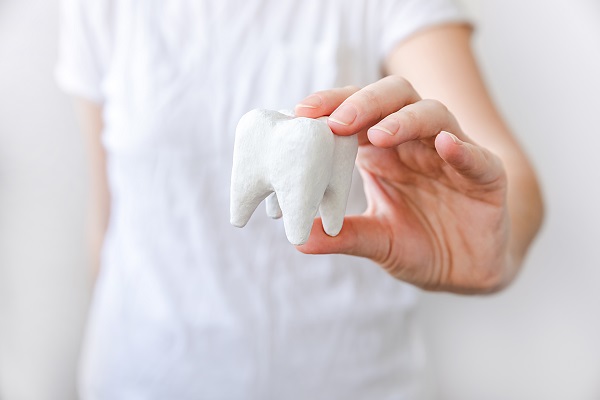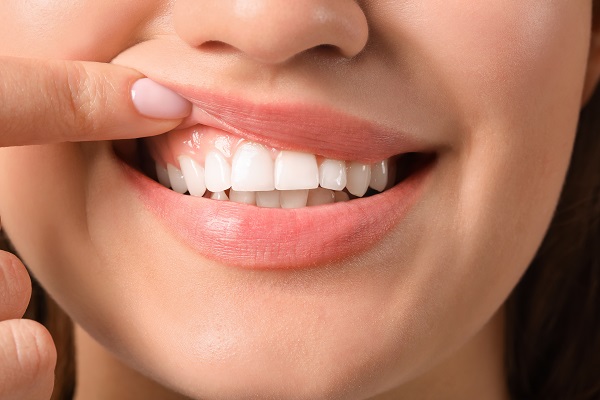How To Ease Sensitivity When Teeth Whitening

A yellowed or dingy smile can be embarrassing for anyone. Fortunately, teeth whitening can help remove years of stains and whiten your teeth several shades. This can help make your smile bright, beautiful, and more youthful.
While teeth whitening is safe for most patients, it can cause some dental sensitivity, especially for those who have already experienced this issue. The discomfort usually subsides on its own within a few days after treatment is complete. Understanding why whitening treatments cause sensitivity and how to manage it can help patients limit this side effect.
Why teeth whitening can cause dental sensitivity
During a professional teeth whitening treatment, a dentist will likely use a type of peroxide gel to remove stains from the teeth. Once this gel is activated, it begins the process of temporarily demineralizing the teeth to penetrate the enamel and target the stains. This demineralization can cause an increase in sensitivity, as it often exposes the microtubules that connect to tooth nerves. Once the treatment is complete, the teeth should remineralize, closing up the microtubules and easing sensitivity.
Another source of discomfort after teeth whitening is gum irritation. While this is rare with professional treatments, it is relatively common when using at-home whitening gels, strips or kits. The ingredients in these products can irritate the soft tissues of the mouth. Unfortunately, it can be difficult to prevent the whitening agents from spreading to the gums when applying at home. Dentists have a variety of useful tools and guards to protect these soft tissues, which is one of the many reasons why professional treatment is often the better choice.
How long sensitivity lasts after a professional whitening treatment varies from patient to patient. For many, the effects wear off within 24 to 48 hours. For others, sensitivity can persist for a few weeks. The important thing to remember is that it should gradually improve, even if it takes some time. If you already struggle with severe or chronic tooth sensitivity, you may want to consult with your dentist about other options to enhance your smile.
Tips for dealing with sensitivity from teeth whitening
There are many ways to deal with sensitive teeth. Both prevention and proper home care after the procedure can make a difference. If these tips do not help and symptoms persist or worsen, be sure to see a dentist for evaluation.
Schedule a professional treatment
An experienced dentist can choose the right type of whitening treatment for your needs while applying it with precision and care. This approach can reduce unnecessary discomfort and sensitivity.
Start preparing in advance
Even if your teeth are not sensitive before treatment, it can be helpful to start brushing with a sensitive toothpaste ahead of time. Two weeks before teeth whitening service should be enough to allow your teeth and gums to adjust to the change and enjoy the full benefits.
Talk with the dentist
Sometimes, the severity of a patient's dental sensitivity depends on the type and strength of the treatment used. Talk with a dentist about your options. If sensitivity is a concern for you, choose the gentlest strength that will still help you achieve the desired results.
Clean with care
You will still need to brush and floss your teeth on a regular basis after having your teeth whitened professionally. Continue to use sensitive toothpaste to help take the edge off and try to use lukewarm water when rinsing. Use a soft-bristled toothbrush and avoid brushing aggressively, especially for the first few days after treatment. A gentle touch at a 45-degree angle can help you clean effectively along the gumline without attacking your enamel.
Avoid troublesome foods and beverages
Certain dietary choices can aggravate symptoms and make tooth sensitivity much worse. Stay away from extremely hot or cold items until the discomfort completely subsides. Highly sweet or acidic foods can also trigger sensitivity. Some of the worst culprits include:
- Ice cream
- Sweet or sour candies
- Juice
- Coffee
- Soda
- Alcohol
- Citrus fruits
Limit these options or avoid them altogether to reduce tooth sensitivity.
Conclusion
Teeth whitening is a great way to boost your confidence and improve the overall look of your smile. By the very nature of its process, it can cause some patients to experience tooth sensitivity for a few days. If symptoms persist, taking proactive measures can help reduce and prevent this type of discomfort for more enjoyable treatment results.
Request an appointment here: https://www.southerncalsmiles.com or call Southern Cal Smiles: Susan Fredericks, D.D.S, M.P.H. at (818) 657-8055 for an appointment in our Woodland Hills office.
Check out what others are saying about our dental services on Yelp: Teeth Whitening in Woodland Hills, CA.
Related Posts
Teeth whitening treatments are an effective way to improve the color of your teeth significantly. These treatments consist of using chemicals with bleaching properties like hydrogen carbamide or hydrogen peroxide to remove stains from the inner and outer layers of teeth.The types of stains teeth whitening treatments are effective on include the yellow stains teeth…
Professional teeth whitening sessions can get you the white set of teeth you have always wanted. It involves using products that contain whitening agents like hydrogen peroxide and hydrogen carbamide to oxidize stains and remove them. What is the difference between professional teeth whitening treatments and the countless products sold at drug stores, you ask?…
Teeth whitening treatments work wonders when it comes to improving the way your teeth look. These treatments typically involve using compounds like hydrogen peroxide or hydrogen carbamide to improve the way teeth look. The compounds have bleaching properties and can penetrate past enamel into the inner layers of teeth for a thorough whitening effect. With…
Teeth whitening treatments get you whiter teeth in as little as 60 minutes. These treatments are performed under the supervision of a dentist, and the American Academy for Cosmetic Dentistry states a treatment session can improve the color of a person’s teeth by up to eight shades.Over-the-counter teeth whitening alternatives typically provide a cheaper alternative,…


